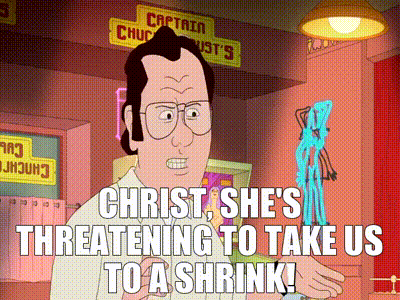Why Are Mental Health Professionals Called Shrinks?
An insult that has become an acceptable slang
The marriage that Frank and Sue share has been on rocky roads for a while. Frank’s facing some financial trouble which has made cash hard to come by. His wife, Sue, has been trying to make the best of what they are earning together but it never seems enough.
The two get into regular arguments and fights that scare little Maureen, their youngest child, next door. One day Sue suggests visiting a priest for some marriage counselling but is immediately told off by Frank. Frank is sure they don’t need a priest involved in their marriage. Sue suggests visiting a psychiatrist.
“Are you calling me crazy?!” Frank responds in anger.
Later that day, Frank is recounting the experience and screams out,
There is quite a lot that can be unpacked psychologically in the relationship Frank and Sue share but today’s story is about something different.
It is about a popular terminology we use for mental health professionals - Shrinks
Why did mental health professionals start getting called shrinks? What does it mean? Where did it start?
Thankfully, I am not the only person who has this question. Silas L. Warner had the same query and here is what they found back in 1982.
Hollywood Origins
The term shrinks was originally limited only to describe Psychiatrists but has since generalized to mental health professionals of any kind. Warner believes that the term is a shortened version of “headshrinker”
Worth noting that the term is not borne out of love or adornment but was used as an insult. It was meant to be used as a disrespectful depiction of psychiatrists.
In 1950, Time magazine claimed that anyone who would have predicted actor Hopalong Cassidy’s success early in his career would have been “led off to a headshrinker” followed by a footnote explaining that the term is “Hollywood jargon for the psychiatrist”
Headshrinker and Mystics
This is where it gets interesting. We don’t know for sure why Hollywood chose to use “headshrinker” as the term to describe psychiatrists.
Warner hypothesizes that this may be due to the history of Psychiatry which has often involved surgeries of the head as a means to treat mental disorders. In the 1940s, frontal head lobotomies were quite popular in the US as well. Read the story about them here.
Warner also believes this may be due to the power dynamics of the patient and the psychiatrist. In some cultures, headhunting and subsequent shrinking are considered an ultimate humiliation for the victim of war. Maybe the term came up because patients saw their psychiatrists as people with too much power who were trying to degrade patients for personal gain.
“Shrink” was an insult to take some of that power away.
The Powers of the Mental Health Professional
While MHPs deny it all the time, sometimes to the point of frustration, the general public believes that psychiatrists and psychologists are full of “tricks” that can “manipulate” people or take control of their behavior.
People don’t understand how our field works and attribute magical or supernatural powers to us. In the face of anxiety of facing such a figure, it is natural for people to use humor as a way to cope. This was the conclusion reached by Fuller (1972) and Redlich (1949) as well.
“A head-shrinker is [seen as] a witch doctor whose knowledge of the occult constitutes a powerful magic that justifies the re-establishment of infantile dependency.”
Fuller in his analysis of cartoons depicting psychiatrists, 1972
Over time, the term has generalized from psychiatrists to psychoanalysts and therapists as well. The origin of the term probably is placed in how the work of our field is perceived by those outside it and is a way to reduce the fantasized magical powers of the professionals of the mind.
Question of the Week
Have you ever used the term “Shrink” to describe a mental health professional? Did you mean it as an insult as well?







Hi! The article is quite informative. I have not come across anybody using the term "shrink" in India. At least not in the Hindi speaking states. However, even if it is hurled as an insult, its upon us to decide whether to take it as an insult.
Such an informative piece!